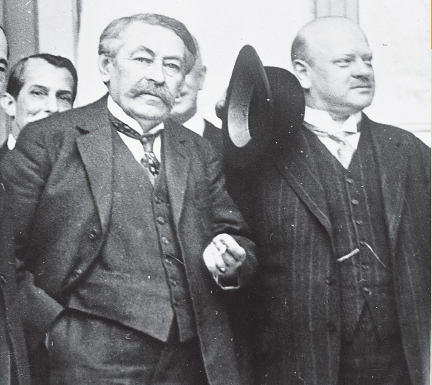Individuals in Society: Gustav Stresemann

German foreign minister Gustav Stresemann is a controversial historical figure. Hailed in the 1920s as a hero of peace, he was denounced as a traitor by radical German nationalists and Hitler’s Nazis. After World War II, revisionist historians stressed Stresemann’s persistent nationalism and cast doubt on his peaceful intentions. Weimar Germany’s most renowned leader is a fascinating example of the restless quest for convincing historical interpretation.
Stresemann’s origins were modest. His parents were Berlin innkeepers and beer retailers, and of their five children, only Gustav attended high school. Attracted first to literature and history, Stresemann later turned to economics, earned a doctoral degree, and quickly reached the top as a manager and director of German trade associations. A highly intelligent extrovert with a knack for negotiation, Stresemann became a deputy in the German Reichstag (parliament) in 1907 as a business-
Although Stresemann opposed the Treaty of Versailles as unjust and unrealistic, he turned toward the center instead of the far right. He accepted the new Weimar Republic and played a growing role in the Reichstag as the leader of his own small probusiness party. His hour came when French and Belgian troops occupied the Ruhr. Named chancellor in August 1923, he called off passive resistance and began talks with the French. His government also quelled Communist uprisings; put down rebellions in Bavaria, including Hitler’s attempted coup; and ended runaway inflation with the introduction of a new currency. Stresemann fought to preserve German unity, and he succeeded.
Voted out as chancellor in November 1923, Stresemann remained as foreign minister in every German government until his death in 1929. Proclaiming a policy of peace and agreeing to pay reparations, he achieved his greatest triumph in the Locarno agreements of 1925 (see page 828). But these agreements did not lead the French to make any further concessions that might have disarmed Germany’s extremists. Stresemann made little additional progress in achieving international reconciliation and true sovereignty for Germany. His premature death in office was a serious blow to German pragmatism, encouraging the turn to a more aggressive and nationalist foreign policy.
Stresemann was no fuzzy pacifist. Historians debunking his legend are right in seeing an enduring nationalism in his defense of German interests. But Stresemann, like his French counterpart Aristide Briand, was a statesman of goodwill who wanted peace through mutually advantageous compromise. A realist trained by business and politics in the art of the possible, Stresemann perceived that Germany had to be a satisfied and equal partner for peace to be secure. His unwillingness to guarantee Germany’s eastern borders (see Map 25.4), which is often criticized as contributing to the coming of the Second World War, reflected his conviction that keeping some Germans under Polish and Czechoslovakian rule created a ticking time bomb in Europe. Stresemann was also convinced that war on Poland would almost certainly re-
*Robert Grathwol, “Stresemann: Reflections on His Foreign Policy,” Journal of Modern History 45 (March 1973): 52–
QUESTIONS FOR ANALYSIS
- What did Gustav Stresemann do to promote reconciliation in Europe? How did his policy toward France differ from that toward Poland and Czechoslovakia?
- What is your interpretation of Stresemann? Does he arouse your sympathy or your suspicion and hostility? Why?

ONLINE DOCUMENT PROJECT
What were some of the challenges that leaders like Stresemann faced in building political consensus in Weimar Germany?
Examine documents that illuminate the competing visions of major Weimar political parties during the 1920s. Then complete a writing assignment based on the evidence and details from this chapter.
See Document Project for Chapter 26.